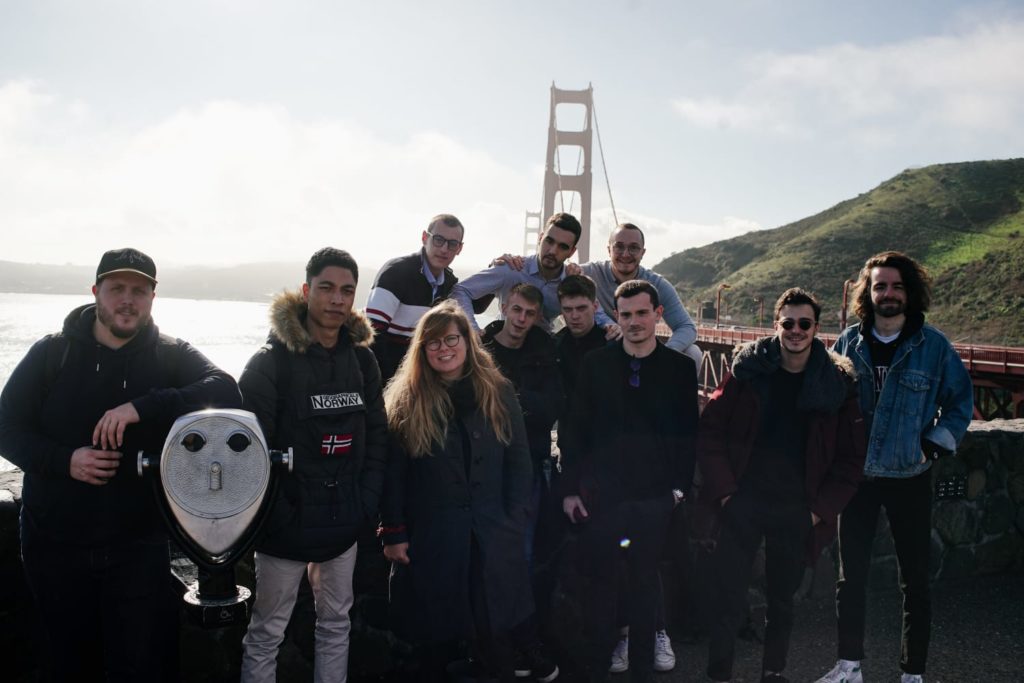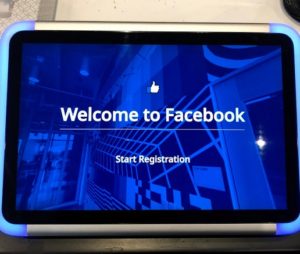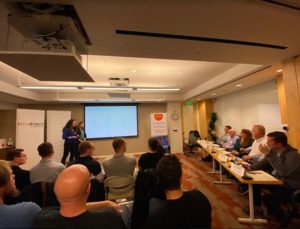
In Silicon Valley, everything changes at 1000 miles an hour and so do our startups!
Continuing their journey in Silicon Valley, our 10 start-uppers wake up this Thursday morning with stars in their eyes: in a few hours, they will visit Facebook and The Refiners accelerator!
Today we follow Victor Gourdon (Pimp my Sound), who happily recounts his extraordinary day.

“We finally push open the doors of Facebook and are warmly welcomed by Julien Schleret, Brand Marketing Manager for the company and a PGE 2010 graduate from NEOMA. Julien knows why he is there. He explains that after starting his career in Dublin, he wanted to get closer to the place where everything was happening, everything was decided, everything was moving at 1000 miles an hour: Silicon Valley. A frantic pace that has not changed since then and that’s exactly what he likes!
Facebook is clearly no longer a startup, but we nevertheless spot certain similarities in operation, in particular the multiplication of small independent teams in charge of their activities, as is the case for Julien’s Division. His watchword: test & learn! Julien has enough freedom to test and quickly improve all of his products, a real plus for this company whose huge size does not prevent it from efficiently making progress.
But it’s not always simple. The exponential growth of Facebook has nonetheless brought its share of problems. How do you switch easily from 0 to a few billion users? One of the answers was obvious: recruit and restructure! That’s how Julien’s social media team came into being.
Recruitment is a subject that comes up very often in our discussions. The race for talent is raging and the turnover in each structure is very high. Far from being a source of concern for Julien, he explains that this is precisely where the strength of Silicon Valley lies and it allows Facebook to acquire the best talents while ensuring its employees’ motivation. His vision is a positive one, and it also teaches us, as future business leaders, the importance of good recruitment and the loyalty of our recruits.
The visit is coming to an end, but my colleagues have time to ask for advice on how to optimize their Facebook accounts and their digital communication, and off we go again.
We are fortunate enough to meet Carlos Diaz, one of the co-founders of The Refiners accelerator, which supports startups from all around the world to develop here in Silicon Valley. Having worked for 10 years in the field, Carlos knows his subject well and gives us some very honest advice and his impressions. A special moment of sharing from which we each learn a lot.
Like Julien, Carlos believes that it is in Silicon Valley that “everything happens”, especially if you want to launch a tech project.
For Philemon (Barks), Carlos does not focus on the subject of investment at the entrepreneurial level, but at the financial level. Unaccustomed to this vision of things, we also learn a great deal. In Silicon Valley, investors are looking for nothing less than “unicorns” (startups worth over $1 billion) and hand out millions of euros to a select, happy few of contenders. A project searching for less would no doubt be overlooked because its ambitions would not live up to their expectations. Carlos explains that the fund-raising process involves many people who all have their own goals. Whether it’s venture capital, hedge funds, banks, limited partners… everyone expects a return on investment from the startup that justifies their commitment. The figures speak for themselves: in general in San Francisco, an investment fund meets 3,000 startups and ultimately invests in 15 of them, giving a 0.5% chance of raising funds. The pressure is mounting and we start to gradually realize the intensity of competition in the region.
 How can we stand out from the mass of startups? First of all by knowing how to pitch! An investor effectively studies the profitability of a product, but also the personalities of the entrepreneurs who launch them. They must be capable, in a few moments, of convincing their audience and investing in the venture. Second, Carlos believes that a bad manager in a buoyant market can survive, whereas an excellent manager in a dying market is heading straight for failure. He therefore insists on the need to keep abreast of changing market trends in order to always anticipate and position oneself intelligently. The market, ultimately, is even more important than the concept itself.
How can we stand out from the mass of startups? First of all by knowing how to pitch! An investor effectively studies the profitability of a product, but also the personalities of the entrepreneurs who launch them. They must be capable, in a few moments, of convincing their audience and investing in the venture. Second, Carlos believes that a bad manager in a buoyant market can survive, whereas an excellent manager in a dying market is heading straight for failure. He therefore insists on the need to keep abreast of changing market trends in order to always anticipate and position oneself intelligently. The market, ultimately, is even more important than the concept itself.
This kind of reasoning, which focuses on the potential of the project more than on the project itself, marks us all and clearly modifies our way of selling ourselves. It’s a real lesson for Julian (Picme), Vincent (Drive Eco’Vrac) and Florian (Pomelo) who immediately think about a new presentation pitch.
Thanks to this meeting with the co-founder of The Refiners, Lucile Derly (Nicomed) is gaining confidence in her project in healthcare. Carlos confirms that it is one of the most promising sectors for the future, with great opportunities for international development.
Florian also recognizes the importance of a balanced team of co-founders with a tech profile, a business profile and a design profile (product + experience).
Share on Facebook Share on Twitter Share on Pinterest